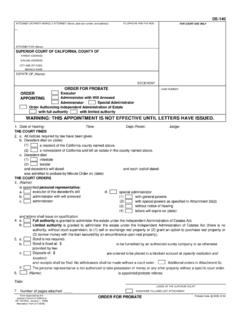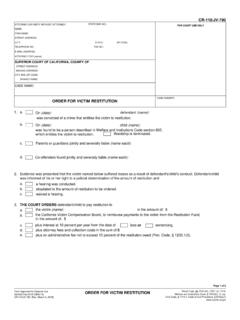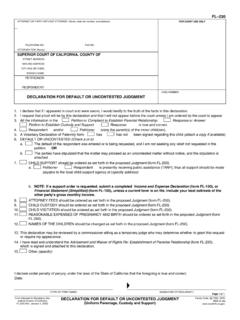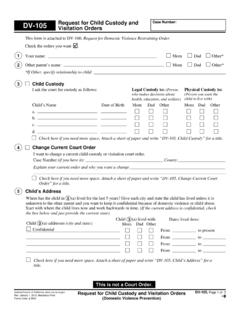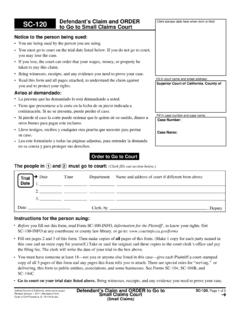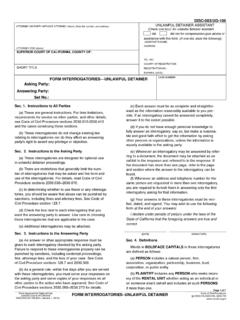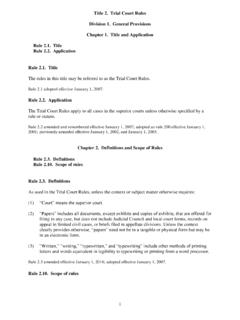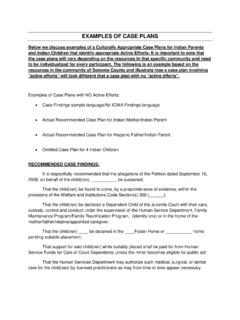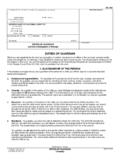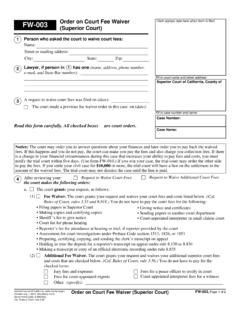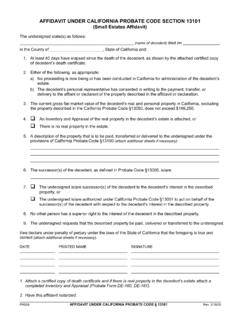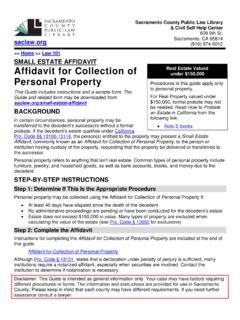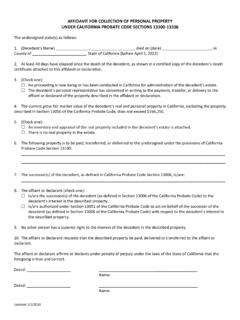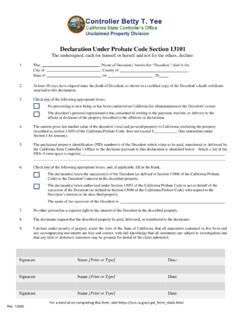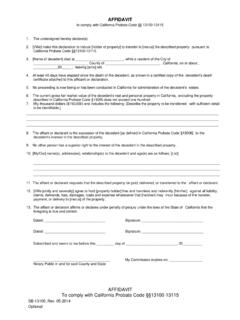Transcription of Probate Guide - California Courts - Home
1 Do I have to go to Court toinherit property fromsomeone who dies?Not always. If you have the legal right toinherit personal property, like money ina bank account or stocks, and theestate is worth $100,000 or less, youmay not have to go to court. There is a simplified process you canuse to transfer the property to yourname. But this process is not for realproperty, like a do I know if the estateis worth $100,000 or less? To calculate the value of the estate:Include: All real and personal property All life insurance or retirement benefits that will be paid to the estateDo not include: Cars Real property outside of California Property held in trust, including a living trust. Real or personal property that the person who died owned with someone else (joint tenancy) Property (community, quasi-community or separate) that passed directly to the surviving spouse Life insurance, death benefits or other assets not subject to Probate that pass directly to the beneficiaries Unpaid salary or other compensation up to $5,000 owed to the person who died.
2 The debts or mortgages of the person who died. For a complete list, see Probate code I subtract the deadperson s debts to calculatethe value of the estate?No. You are not allowed to subtract thedebts of the person who died. What if the estate is inProbate?You cannot use this process, unless thePersonal Representative of the estateagrees in writing to let you do anyone use thissimplified process?You qualify if you have the legal right toinherit property from the person whodied. You must be a beneficiary in theWill or an heir if the person died withouta Will. Other people may qualify too, likethe guardian or conservator of theestate. For a complete list, see Probate code property when someone do I transfer theproperty to my name?If you have the right to inherit thatproperty, give an affidavit to the person, company or bank that has theproperty if there are manyassets to transfer?
3 You can list all assets in one , you can do one affidavit foreach do I write the affidavit?Many banks and other institutions havetheir own affidavit. So, check with themfirst and ask for one. If they don t haveone, you can use the sample affidavitattached to this if other people arealso entitled to inheritproperty from the personwho died?All of you must sign the affidavit. Thisshows you all agree that the propertylisted on your affidavit can betransferred to I have to notarize theaffidavit?No. But many institutions will ask you it is a good idea to notarize I have to attach anyother documents to theaffidavit?Yes. Attach: Acertified copy of the death certificate of the person who died Proof that the person who died owned the property (like a bank passbook, storage receipt, stock certificate) Proof of your identity (like a driver s license or passport) An inventory and appraisal of all real property owned by the decedent in California How long do I have to waitto transfer the property?
4 You must wait at least 40 days after theperson dies. What if I need help?You can talk to a lawyer. Call theLawyer Referral Service of the SanFrancisco Bar Association:415-989-1616 Or, go to the ACCESS Center:Civic Center Courthouse, Room 208400 McAllister Street, San Francisco415-551-5880Or, read the law on property California Probate code , Pursuant to California Probate code 13100-13115I, _____ state as (name of decedent), died on _____ (date of death) inthe County of San Francisco, least 40 days have passed since the death of the decedent, as shown by the attached certifiedcopy of the decedent s death current gross value of the decedent s real and personal property in California , excluding the property described in Probate code 13050, does not exceed $100, following property is to be paid, transferred or delivered to the undersigned according to Probate code 13100.
5 [describe the property to be transferred] successor(s) of the decedent, as defined in Probate code 13006 , is/ other person has a right to the interest of the decedent in the described request that the above-described property be paid, delivered or transferred to the declare under penalty of perjury under the laws of the State of California that the foregoing is true and NamePrint Name[If more than one declarant is entitled to receive the described property, all need to sign this affidavit. Ifthis is the case, additional declarants can sign below.]DateSign NamePrint NameDateSign NamePrint Name No proceeding is now being or has beenconducted in California for administrationof the decedent s estate. The decedent s Personal Representativehas consented in writing to the payment,transfer, or delivery of the propertydescribed in this declaration.
6 An inventory and appraisement of the real property included in thedecedent s estate is attached; There is no real property in the estate. a succesor(s) of the decedent to thedecedent s interest in the describedproperty authorized under Probate code 13051 toact on behalf of the decedent s successor(s)with respect to the decedent s interest in thedescribed propertyAdministrator:the person (usually the spouse, domestic partner or close relative) that the court appoints to manage the estate of a person who dies without a Will. The administrator is also called the personal representative of the :a person who inherits when there is a :the person who s Estate:all real and personal property that a person owned at the time of :a person named in a Will and appointed by the court to carry out the dead person s wishes.
7 The executor is also called the personal representative of the :a person who inherits when there is no Will:a Will that is handwritten, dated and signed by the person writing the :when someone dies without leaving a Will. Intestate succession:the order of who inherits property when someone dies without a Trust:a trust set up during the life of a person to distribute money or property to another person or Property:things like cash, stocks, jewelry, clothing, furniture, or cars. Personal Representative:the administrator or executor that the court appoints to manage the :the legal process of administering a Will in court. The court process for distributing a dead person s assets, paying debts owed by the dead person and settling the financial affairs of peoplewhen they Property:buildings and land.
8 Successor:anyone who has the legal right to receive property of a person who dies, either under the Will or the Probate :when someone dies leaving a :an arrangement where property is given to someone to be held for the benefit of another :a legal paper that lists a person s wishes about what will happen to his or her property after death. Probate cases use special words. Here are some.
